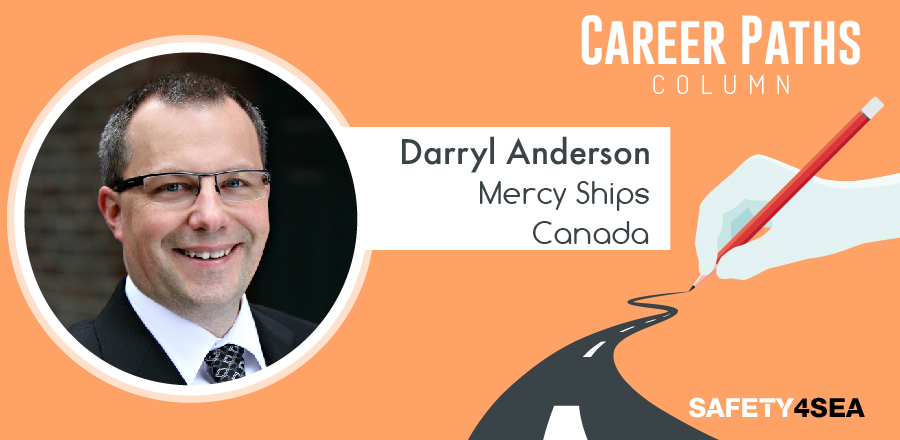In a Safety4Sea special column in March 2021, they hosted an interview with Darryl Anderson.
Mr Anderson highlights that the pandemic has showed how critical issues are crew members’ safe exchange and repatriation. It is morally wrong to enjoy the economic benefits of international shipping and not care for mariners, he concludes.
How did it come about that you joined the shipping industry and your field of expertise specifically?
Darryl Anderson became involved in the shipping industry through my work experience in the harbour and port management sector. I specialize in strategy, international business development, maritime transportation, and logistics real estate solutions.
What about your current job/ role most excites you and why?
Executive Director of Mercy Ships Canada and Managing Director of Wave Point Consulting Ltd. are my current roles. In 2021, Mercy Ships will take delivery of a new purpose-built hospital ship, the MV Global Mercy. This new hospital ship will join our current vessel, the MV Africa Mercy, serving a new generation of patients and volunteers. It is an exciting time to be part of the global leadership team that will help scale and grow the organization, so together, we are better positioned to strengthen healthcare systems in Africa.
When you think of the word successful, who’s the first person who comes to mind and why?
Don and Deyon Stephens, the founders of the international charity Mercy Ships, are at the top of my list. Mercy Ships currently operates the largest non-governmental hospital ships in the world. Their vision for providing humanitarian aid like free health care, community development projects, and servant leadership is exemplary.
Who is/was the most influential person/mentor to you & why?
Four captains, two from industry – Gordon Houston and Alex Smith – and two from the maritime policy world – Dr. Devinder Grewal and Sam Bateman – were influential. Each person demonstrated a commitment to the highest level of excellence and knew how to offer perspective, personal encouragement and unseen support.
What is the most worthwhile career investment (in energy, time, money) you’ve ever made?
Being the first Canadian to complete a Master of Business Administration from the Australian Maritime College was a significant career decision. Pursuing and completing the program introduced me to the four influential individuals listed above.
What is the best, and what was the worst piece of advice you’ve ever been given and why?
Very early in my career, my boss asked me if I was prepared to offer him a professional commitment that was long enough for me to be exposed to living with and fixing my own mistakes. As a result of my promise, my boss then invested his influence, time, and energy to develop my commitment to the mission and its long-term success and personal development as a leader.
Pursuing your passion is the worst career advice because being a resilient person takes much more than desire.
If you could give a piece of advice to your 18-year-old-self, one thing, what would it be and why? What piece of advice should you ignore?
Invest your time, energies and talents in a vision and mission that is much, much larger than yourself and not your next immediate career step because service to others is where you will find deep satisfaction and an opportunity to make an impact.
In the last five years, what new belief, behaviour, or habit has most improved your business life.
Coming to the self-understanding that helping organizations thrive through overcoming the obstacles of moving goods and people to market was my calling. Developing a broader vision of the future and service and understanding where I could make a difference with my professional training and experience has opened more opportunities than there is time to pursue.
What would you like to change in the current maritime landscape and your area of expertise specifically, and why?
The challenges faced by seafarers due to COVID-19 and the need for government and policy changes that will allow for crew members’ safe exchange and repatriation are critical. It is morally wrong to enjoy the economic benefits of international shipping and not care for mariners.
What is your personal motto?
Help us, God, to live in the abundance for which you made us and to bring that abundance to every part of your world.

